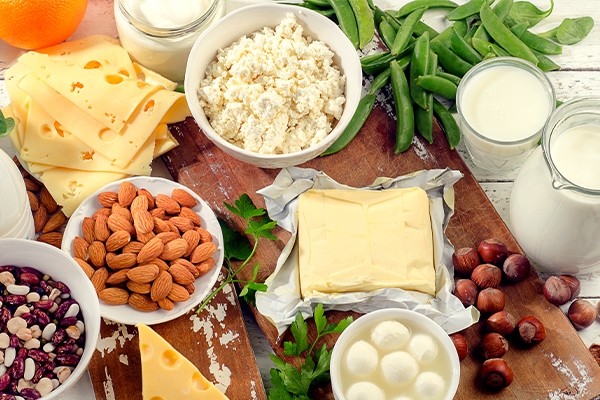Nutrition for Healthy Bones

Maintaining bone health is easier than you might believe. Understanding dietary patterns, exercising regularly, and living a healthier lifestyle can impact bone mass later in life.
Maintaining healthy and strong bones is crucial. Strong bones support the body, allow for movement, and protect vital organs such as the heart and lungs. Building strong and healthy bones during childhood and adolescence is an important step toward maintaining bone health.
This is important, because, beyond the age of 30, bone density begins to decrease by 0.5% each year. During this time, calcium should be deposited in the bones. The body naturally prevents excessive bone erosion as long as its nutritional needs are met.
Stooped posture and decreased height are signs of poor bone health. Back pain is one of the more common symptoms. In addition, fractures from minor traumas or falls are also signs of poor bone health.
Osteoporosis can result from a variety of circumstances, including genetics. On the other side, bad eating habits, a lack of exercise, smoking, and long-term alcohol or prescription use, such as prednisone, cortisone, and dexamethasone, can all raise the risk.
Strong bones in old age are the product of good bone health in early life.
How do I maintain bone health?
1. Meet calcium needs

Calcium is the most important nutrient for forming healthy bones. Adults should consume between 1,000 and 1,200 milligrams of calcium each day. Good calcium sources are:
- Milk, cheese, and dairy products
- Green vegetables, such as broccoli, cabbage, and okra. Spinach is not included in this group.
- Soy milk
- Tofu
- Nuts
- Bread or other processed foods
2. Fulfilling your vitamin D needs

Vitamin D increases the body's ability to absorb calcium from meals and promotes bone health. Adults require 600 IU per day of vitamin D. Sunlight is the most prevalent source of vitamin D.
Fatty fish such as salmon, sardines, and mackerel are good sources of vitamin D. The yolk of one large egg contains a high concentration of vitamin D.
3. Regular exercise

A sedentary lifestyle may increase the risk of osteoporosis. Compared to physical activity, this habit increases the risk of bone health problems.
Physical activity strengthens bones and decreases bone loss. Your bones will benefit from exercise from the moment you begin. However, if you start regular exercise when you are young, you will benefit the most. Continue exercising throughout your life.
Make sure you obtain weight-bearing. This includes exercises like walking, running, and stair climbing, which can help prevent additional bone loss and promote bone density.
4. Avoiding smoking and consuming alcohol

Calcium is stored in bones. When the balance of calcium in the body is off, the body will use vitamins, hormones, and other compounds to correct it. However, consuming alcohol can interfere with the body's repair mechanisms.
In addition to disrupting the body's mechanisms, alcohol also disrupts the immune system in ways that affect bone health.
Superfoods for bone health
1. Dark leafy green vegetables
Watercress, arugula, watercress, and kale are among the greatest non-dairy calcium sources. These greens are also high in magnesium, which supports bone strength, and vitamin K, which is needed for bone metabolism.
Although high in calcium, spinach contains oxalates, which can reduce calcium absorption, making it a poor calcium source.
2. Salmon
Sunlight is the primary source of vitamin D. But, consuming fatty fish such as salmon is also another way to meet your vitamin D needs.
3. Tuna
Another fatty fish that is high in vitamin D is tuna. It also contains a lot of other healthy minerals like potassium, magnesium, and omega-3 fatty acids.
4. Cheese
Cheese is made from milk. Milk includes calcium. Among the various types of cheese, mozzarella is the best. For a healthier option, choose cheese made from skim milk.
5. Yogurt
This product has been known since 2,000 B.C. It includes more calcium than the milk from which it was made. According to the NIH, one serving of low-fat yogurt provides 42% of your daily calcium needs.
6. Eggs
Hello egg lovers! Good news for you. Eggs include vitamin D which can improve bone health. Vitamin D can only be found in egg yolks. So, if you like scrambled eggs, vitamin D is everywhere!
7. Nuts
Nuts are high in magnesium and phosphorus, which help to strengthen bones. Magnesium aids calcium absorption and retention in bones.
Meanwhile, phosphorus is an essential component of bone. Bones and teeth contain around 85% of the body's phosphorus.
There are numerous nuts to pick from, including Brazil nuts, cashews, walnuts, peanuts, and pecans. However, almonds are the finest option.
8. Grains
Like nuts, grains contain calcium, magnesium, and phosphorus. Grains also contain fiber and omega-3 fatty acids, which can help lower cholesterol, reduce inflammation, and keep the brain and neurological system healthy.
Chia seeds, pumpkin seeds, and sesame seeds are some of the best grains for your bones.
If you want to consult about vitamin D needs, click on WhatsApp.



